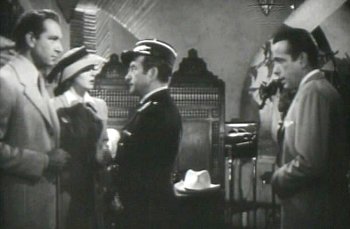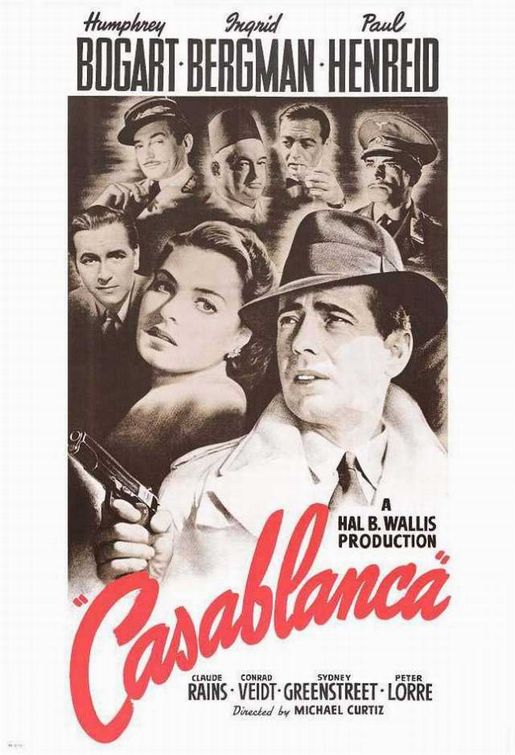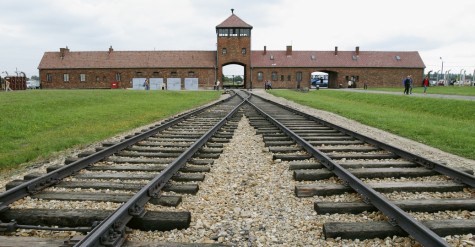Since I posted this, I had a woman Rabbi call me, and, just contributed to the making of this film: http://www.rockethub.com/projects/43758-unspeakable-an-animated-holocaust-documentary
I just got off the phone with Virginia Hambley. I suggested we go see a Rabbi and conduct a ceremony of atonement for her mother’s kindred’s involvement in the Vichy government. She questioned me about this doing any good, after all, she has nothing to feel guilty about. I told her there is the question of the sins of the father being passed down to the son. I told her her father had told me the de Bourmont’s were leaders of the Vichy government. France itself has not made an official apology to the Jews.
This whole idea came about after reading about the movie ‘Casablanca’. Lisa Lund, and Victor Lazio are members of the Czech Resistance. In 1939, the Nazis arrested 1,200 Bohemian College Students and sent them to death camps where they died alongside Jews and Gypsies. My father Victor Presco descends from a immigrant from Bohemia. Virginia’s great grandfather is Victor de Bourmont who stands accused of sending seven Jews to their death. Here are three Victors.
After reading about Casablanca, I took a nap and had a dream. I was praying alone in a room, when the door opened and a hand entered the threshold holding a vine growing in a pot. In minutes I called Virginia, and we had a good talk. I went to bed having a conversation about what I would say to a Rabbi. When I awoke and rehearsed our conversation.
When I got on my computer I read it was the anniversary of Auschwitz. I called Virginia who suffers from severe memory loss after getting into a terrible accident with fellow college students. I have long wondered if this memory loss represents the co0llective guilt of the de Bourmont family who rather then atone, rely on the remedy that our memories grow short. I told Virginia about the students and the oppression of free thinking.
The motto concerning Auschwitz is “Never Forget”.
Jon the Nazarite
Victor de Bourmont is a member of one of the great Angevin aristocratic families. He was born 1907 in Pontivy and died in March 1945 in Pomerania near Kolberg (Korlin). It descends many aristocratic families of the region and of Brittany, including the Cossé-Brissac, and Rohan. Many of her forebears were under the old Regime, presidents or advisors of the Chamber of accounts of Brittany and Normandy.
Married in 1938, he left behind, his death four children in infants. Son of Sain, his father was captain at the beginning of the war of 14-18 to the 160e regiment of infantry, then in 1917, squadron leader. The same year, the uncle of Victor died at Verdun in the ravine of the fountains. After the war, in 1920, Victor learned to know Germany, when his father was assigned to the occupation of the Rhine army. He lived in Landau (1921), and Recklinghausen (1924). The family stayed ten years in Germany, and returned in Brittany as in 1930.
He was the eldest of nine siblings.
Sain, Victor de Bourmont in the 1930s was lieutenant in the Sharpshooters, in Tunisia. During the second world war, he joined the militia , which he was the Chief in Lyon (with Touvier under his command), and then the SS Charlemagne Division in 1944. He was promoted to Hauptsturmführer and commanded this title the 57e infantry regiment of the division which opposed theRed Armyon the eastern front. He had under his command, among others, Henri Fenet. The 57e Régiment was incorporated into the 32e German infantry division. The latter was commander in 1944-1945, lieutenant general Hans Boeckh-Behrens.
https://rosamondpress.com/2013/09/17/de-bourmont-anjou-legitimists/
https://rosamondpress.com/2013/01/04/tale-two-de-bourmonts/
On January 27, 2015, the world will commemorate the 70th Anniversary of the liberation of the Auschwitz death camp. On the Shabbat immediately preceding (January 24), in Synagogues across the world, Jews will read Parshat Bo. This year in particular, Parshat Bo’s lessons have deeper meaning and relevance.
Parshat Bo begins with the Egyptians suffering through the last three of the ten plagues; אַרְבֶּה – Locusts are destroying plants and food supply;
חושך – the country is engulfed in an extraordinary unrelenting darkness;
מכת בכורות -the death of each first born Egyptian male.
Once the final plague is rained down on the Egyptians, Pharaoh forces Bnai Yisrael out of Egypt immediately; without anytime to pack or even for their dough to rise and therefore the only rations they have with them are unleavened bread. From Parshat Bo comes the mandate to commemorate the Exodus from Egypt; Bnai Yisrael must observe the anniversary of the Exodus each year by leading a Seder, removing all chametz from their possession for seven days, eat only matzah, telling the story of the redemption to their children, and all of the other symbolism associated with the Yitziat Mitzrayim. Bnai Yisrael are also given the commandment to wear tefillin on the arm and head as a reminder of the Exodus and their commitment to Hashem.
https://www.youtube.com/watch?v=HZuzJP9OM6I
https://www.youtube.com/watch?v=Wbv6HelU3A4
http://en.wikipedia.org/wiki/Auschwitz_concentration_camp
PARIS — Nazi collaborator Paul Touvier, his voice barely a whisper at times, testified in his defense Tuesday, giving a detailed account of the decision to execute seven Jews during World War II and portraying himself as a troubled functionary acting only under German orders.
“Right to the end, I tried to find another solution,” said Touvier, 78, the first Frenchman ever brought to trial on charges of crimes against humanity. Shown photographs of the slain Jews, mouths and eyes wide open in death, Touvier sputtered, “These photos . . . it’s horrible.”
Touvier, the former intelligence chief of the pro-Nazi French militia, has been on trial for 10 days in a court in Versailles, where a jury of nine is deciding his fate. The maximum penalty under French law is life in prison.
The trial, and the legal battle waged to bring Touvier to court after his arrest in 1989, has renewed a painful, 50-year-old debate in France over the Vichy government’s collaboration with the German occupation during World War II.
![]() Touvier, who was hidden for 45 years by right-wing Catholic priests and monks, has admitted that he handpicked the men who executed the seven Jews in Rillieux-la-Pape, near Lyons, on June 29, 1944. The executions were in reprisal for the assassination by Resistance fighters of the Vichy regime’s propaganda chief, Philippe Henriot, after the D-Day landing.
Touvier, who was hidden for 45 years by right-wing Catholic priests and monks, has admitted that he handpicked the men who executed the seven Jews in Rillieux-la-Pape, near Lyons, on June 29, 1944. The executions were in reprisal for the assassination by Resistance fighters of the Vichy regime’s propaganda chief, Philippe Henriot, after the D-Day landing.
In earlier testimony, Touvier had claimed memory lapses. But Tuesday, he said he wanted to give a full account of the events leading up to the executions.
He said he had just returned to Lyons from Vichy on June 28, 1944, when his French superior, Victor de Bourmont, told him of Henriot’s death and of the decision by Lyons Gestapo chief Werner Knab to respond with “a spectacular execution of 100 Jews.”
“De Bourmont was panic-stricken, and I was panic-stricken too,” Touvier testified, noting that an agreement then was struck, cutting the number of Jews to be executed.
“We tried to reduce the number of victims from 30,” he said. “I said we would do seven at a time.”
Touvier said Knab became preoccupied with other matters and didn’t notice the change in number. Touvier’s aide, Albert Reynaud, chose the seven prisoners, he testified.
“We could not avoid the catastrophe,” Touvier had testified earlier. “But I did, even so, save 23 human lives.” That is the crux of Touvier’s defense: that he was following German orders and that, by his actions, some lives were saved.
The seven refugees, ages 23 to 64, were lined up against the wall of a cemetery in Rillieux and shot one by one, first in the back, then in the head. “It had been decided. It had been done,” Touvier said.
After the executions, “I spent a very bad night,” he testified. And the next day, he said, he saw a Jesuit priest and confessed. “I never forgot this tragedy,” he testified. “I said Mass. Mass for Jews is valid.”
Touvier’s fate rests in large part on whether the jury decides that the executions fall under the legal definition of a crime against humanity, which is a crime willingly carried out as a deliberate policy of genocide. And a key question is whether the Vichy regime had, on its own, a policy of genocide.
Casablanca is a 1942 American romantic drama film directed by Michael Curtiz and based on Murray Burnett and Joan Alison‘s unproduced stage play Everybody Comes to Rick’s. The film stars Humphrey Bogart, Ingrid Bergman, and Paul Henreid; it features Claude Rains, Conrad Veidt, Sydney Greenstreet, Peter Lorre, and Dooley Wilson. Set during World War II, it focuses on an American expatriate who must choose between his love for a woman and helping her Czech Resistance leader husband escape the Vichy-controlled Moroccan city of Casablanca to continue his fight against the Nazis.
http://www.telegraph.co.uk/history/world-war-two/11371241/Holocaust-Memorial-Day-commemorations-across-Europe-mark-70th-anniversary-of-Auschwitz-liberation-latest.html
Vichy France, officially the French State (État français), was the government of Marshal Philippe Pétain‘s regime 1940–44, during World War II. From 1940 to 1942, while nominally the government of France as a whole, Vichy only fully controlled the unoccupied zone in southern France, while Germany occupied northern France. Following the Allied landings in French North Africa on 8 November 1942, southern France was also occupied by the Axis on 11 November 1942 through the enactment of Case Anton. The Vichy regime remained in existence, but was reduced to a puppet government.
After being appointed Premier of France by President Albert Lebrun, Marshal Pétain ordered his men to sign the Second Armistice at Compiègne on 22 June 1940 with Germany. He then established an authoritarian regime by gaining full powers on 10 July 1940 to replace the French Third Republic that was dissolving due to the fall of France earlier in 1940
Vichy sought an anti-modern counter-revolution. The Right in France, with strength in the aristocracy and among Catholics, had never accepted the republican traditions of the French Revolution. It demanded a return to traditional lines of culture and religion and embraced authoritarianism while dismissing democracy.[4] The Communist element, strongest in labour unions, turned against the regime in June 1941, when Germany invaded the Soviet Union. Vichy was intensely anti-Communist and generally pro-Nazi; Payne finds that it, “was distinctly rightist and authoritarian but never fascist.”[5] Paxton analyzes the entire range of Vichy supporters, from reactionaries to moderate liberal modernizers, and concludes that genuine fascist elements had but minor roles in most sectors.[6]
The regime tried to assert its legitimacy by symbolically connecting itself to the Gallo-Roman period of France’s history, and celebrated the Gaul chieftain Vercingetorix as the “founder” of the nation.[7] It was maintained that as the defeat of the Gauls in the Battle of Alesia had been the moment in French history when a sense of common nationhood was born, the defeat of 1940 would again unify the nation.[7] The regime’s “Francisque” insignia featured two symbols from the Gallic period: the baton and the double-headed hatchet (labrys) arranged so as to resemble the fasces, symbol of the Italian Fascists.[7]
was a chieftain of the Arverni tribe; he united the Gauls in a revolt against Roman forces during the last phase of Julius Caesar‘s Gallic Wars.
Vercingetorix came to power in 52 BC: he raised an army and was proclaimed king at Gergovia. He immediately established an alliance with other Gallic tribes, took command and combined all forces, and led them in Gaul’s most significant revolt against Roman power. He won the Battle of Gergovia, in which 46 centurions and 700 legionaries died and more than 6,000 people were injured, whereupon Caesar’s Roman legions withdrew.
However, a few months later, in the Battle of Alesia, the Romans besieged and defeated his forces and captured him. He was held prisoner for five years. In 46 BC, as part of Caesar’s triumph, Vercingetorix was paraded through the streets of Rome and then executed by strangulation on Caesar’s orders. Vercingetorix is primarily known through Caesar’s Commentaries on the Gallic War.
http://en.wikipedia.org/wiki/Vercingetorix
The United States granted Vichy full diplomatic recognition, sending Admiral William D. Leahy to France as American ambassador. President Franklin D. Roosevelt and Secretary of State Cordell Hull hoped to use American influence to encourage those elements in the Vichy government opposed to military collaboration with Germany. The Americans also hoped to encourage Vichy to resist German war demands, such as for air bases in French-mandated Syria or to move war supplies through French territories in North Africa. The essential American position was that France should take no action not explicitly required by the armistice terms that could adversely affect Allied efforts in the war.
Germany interfered little in internal French affairs for the first two years after the armistice, as long as public order was maintained.[9]:139 As soon as it was established, Pétain’s government voluntarily took measures against the undesirables: Jews, métèques (immigrants from Mediterranean countries), Freemasons, Communists, Gypsies, homosexuals,[citation needed] and left-wing activists. Inspired by Charles Maurras‘ conception of the “Anti-France” (which he defined as the “four confederate states of Protestants, Jews, Freemasons and foreigners”), Vichy persecuted these supposed enemies.
In July 1940, Vichy set up a special Commission charged with reviewing naturalizations granted since the 1927 reform of the nationality law. Between June 1940 and August 1944, 15,000 persons, mostly Jews, were denaturalized.[43] This bureaucratic decision was instrumental in their subsequent internment.
The internment camps already opened by the Third Republic were immediately put to new use, ultimately becoming transit camps for the implementation of the Holocaust and the extermination of all “undesirables”, including the Romani people (who refer to the extermination of Gypsies as Porrajmos). A law of 4 October 1940 authorized internments of foreign Jews on the sole basis of a prefectoral order,[44] and the first raids took place in May 1941. Vichy imposed no restrictions on black people in the Unoccupied Zone; the regime even had a mulatto cabinet minister, the Martinique-born lawyer Henry Lemery.[45]
When Laszlo makes inquiries, Ferrari, a major underworld figure and Rick’s friendly business rival, divulges his suspicion that Rick has the letters. In private, Rick refuses to sell at any price, telling Laszlo to ask his wife the reason. They are interrupted when Strasser leads a group of officers in singing “Die Wacht am Rhein“. Laszlo orders the house band to defiantly play “La Marseillaise“. When the band looks to Rick, he nods his head. Laszlo starts singing, alone at first, then patriotic fervor grips the crowd and everyone joins in, drowning out the Germans. In retaliation, Strasser has Renault close the club.
That night, Ilsa confronts Rick in the deserted café. When he refuses to give her the letters, she threatens him with a gun, but then confesses that she still loves him. She explains that when they first met and fell in love in Paris in 1940, she believed that her husband had been killed attempting to escape from a concentration camp. Later, while preparing to flee with Rick from the imminent fall of the city to the German army, she learned that Laszlo was alive and in hiding. She left Rick without explanation to tend her ill husband.








Reblogged this on rosamondpress.